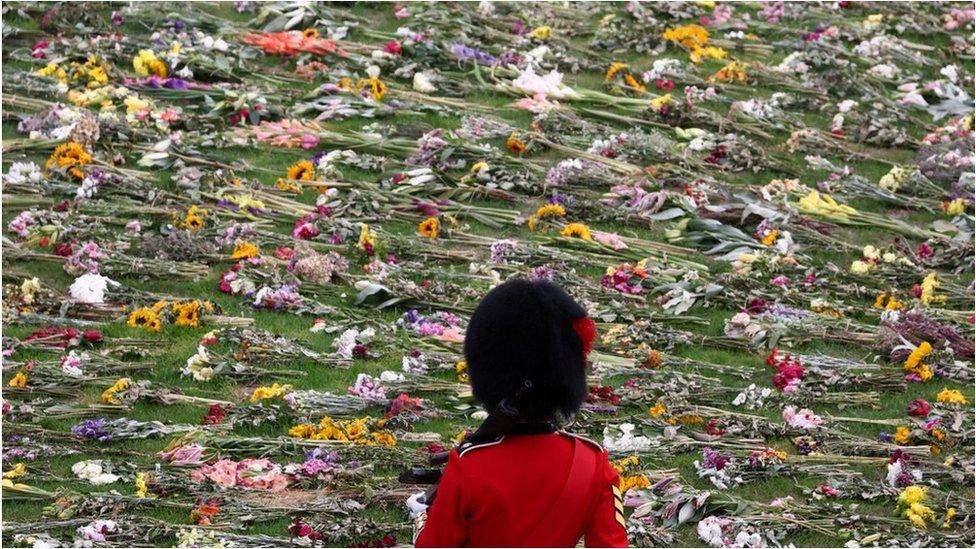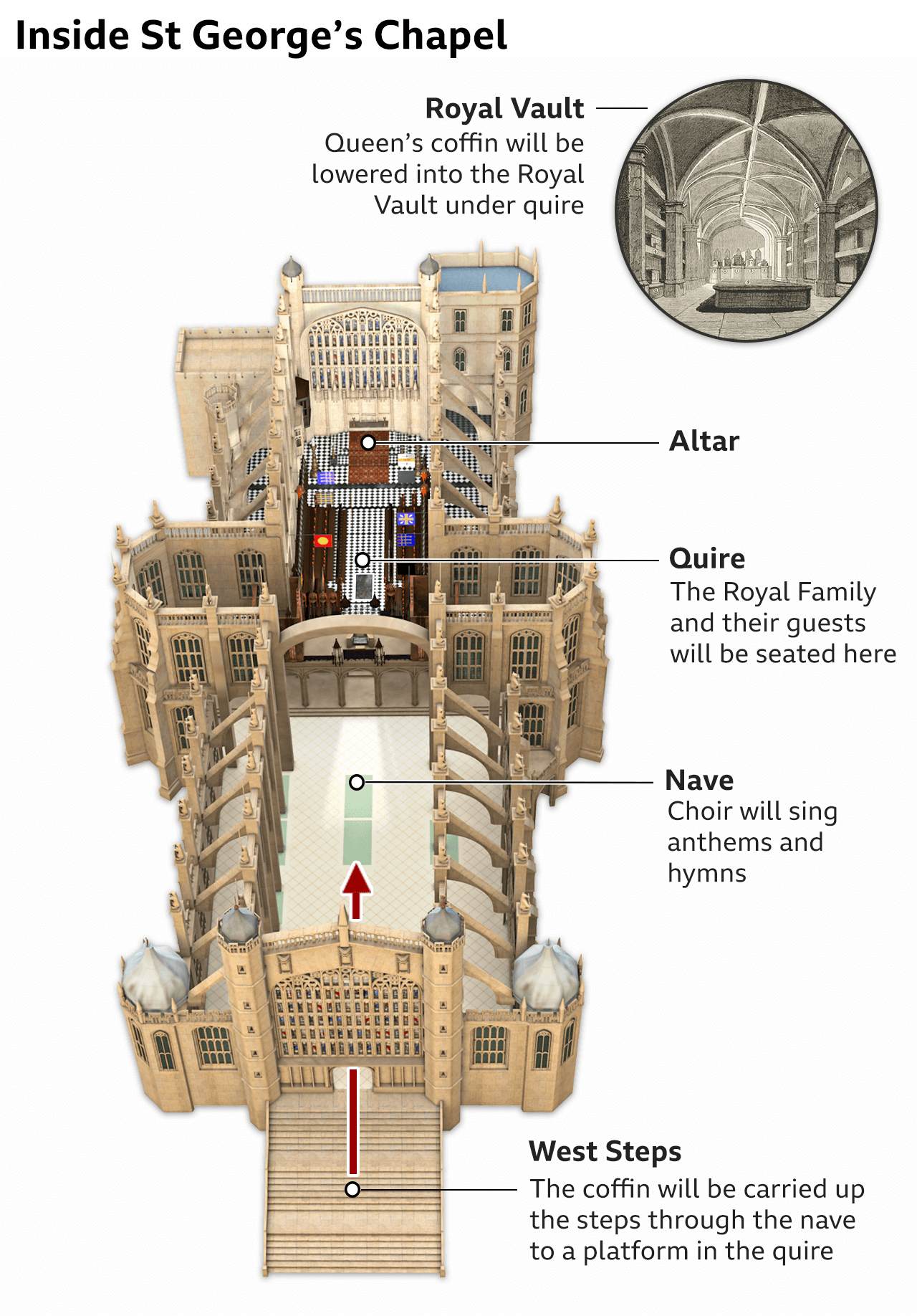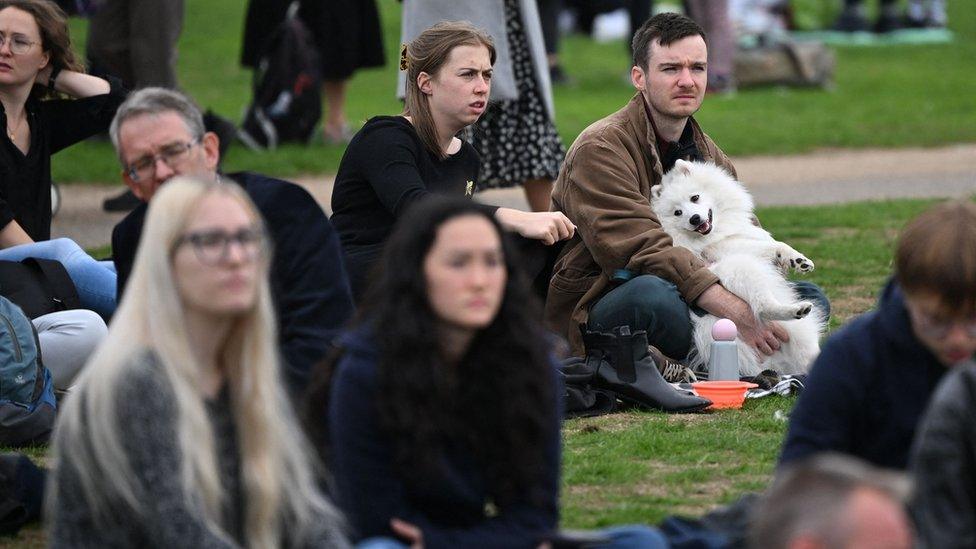What is a state funeral? Where is the Queen buried? And other questions
- Published

Queen Elizabeth II has been laid to rest at Windsor Castle after a state funeral took place at Westminster Abbey.
It marked the final day of a period of national mourning since the Queen's death.
What events marked the Queen's funeral?
The Queen's state funeral was held at Westminster Abbey in London, the historic church where Britain's kings and queens are crowned. A two-minute national silence was held at its end.
The Queen's coffin then travelled in a procession to Wellington Arch, at London's Hyde Park Corner, before being taken to Windsor Castle in the State Hearse.
Watch moments from the funeral of Queen Elizabeth II
After a procession up the castle's Long Walk, a committal service, with a smaller congregation, took place at St George's Chapel.
The Queen was buried later at a private family service.
Where was the Queen buried?
At the end of the committal service at Windsor Castle, the Queen's coffin was lowered into the Royal Vault.
Later, it was interred at the King George VI memorial chapel, inside St George's Chapel. The Queen was buried together with her late husband, the Duke of Edinburgh.

Why was the Queen buried at Windsor and where is it?
Windsor Castle is in the town of Windsor, about 20 miles west of central London.
The castle, which is an official royal residence, has been home to monarchs for almost 1,000 years.
It had special significance to the Queen throughout her life. As a teenager she was sent there during the war years as London faced the threat of bombing.
More recently, she made it her permanent home during the coronavirus pandemic.
St George's Chapel, within the walls of Windsor Castle, is the church regularly chosen by the Royal Family for weddings, christenings and funerals.
It is where the Duke and Duchess of Sussex, Prince Harry and Meghan, were married in 2018 and where the Queen's late husband Prince Philip's funeral was held.

People watched the proceedings on big screens in towns and cities across the UK
Where can I find the order of service?
Buckingham Palace released the order of service for the funeral, which includes details of all the music and the readings.
The order of service for St George's Chapel, Windsor, was also published.
Who attended the funeral?
About 2,000 guests attended the funeral at Westminster Abbey. Among the members of the Royal Family who were there were Prince George (9) and Princess Charlotte (7), the oldest children of the Prince and Princess of Wales.
Joining them were about 500 leaders and dignitaries from the UK and around the world.
The guests at the smaller committal service were largely made up of current and former staff from the Queen's household and private estates.
What is a state funeral?
A state funeral is typically held for a king or queen and follows strict rules of protocol.
A military procession carries the coffin to Westminster Hall, and is followed by a period of lying-in-state, and a service at Westminster Abbey or St Paul's Cathedral, external.
In rare cases, a state funeral can also be held for "other exceptionally distinguished persons". These have included Sir Isaac Newton, Lord Nelson, the Duke of Wellington and Lord Palmerston.
Who wore military uniform at the funeral?
Buckingham Palace said that only working members of the Royal Family who hold military rank would wear uniform at the five ceremonial events marking the Queen's death, including the funeral.
Prince Andrew and the Duke of Sussex did not wear uniform to most events, although an exception was made for the vigils held in Westminster Hall.
Watch: King, siblings and sons walk behind Queen's coffin
Were shops and schools open?
Monday was a bank holiday, and many shops and businesses were closed, as were schools.
GP surgeries were told they could close, some dentists did not see patients and some hospitals cancelled routine appointments.
Some extra trains were added for people travelling to and from London.
When is the coronation?
No date has been set so far for the coronation, which is when King Charles is formally crowned.
The ceremony is unlikely to take place immediately, because of the planning required. Queen Elizabeth succeeded to the throne in February 1952, but was not crowned until June 1953.